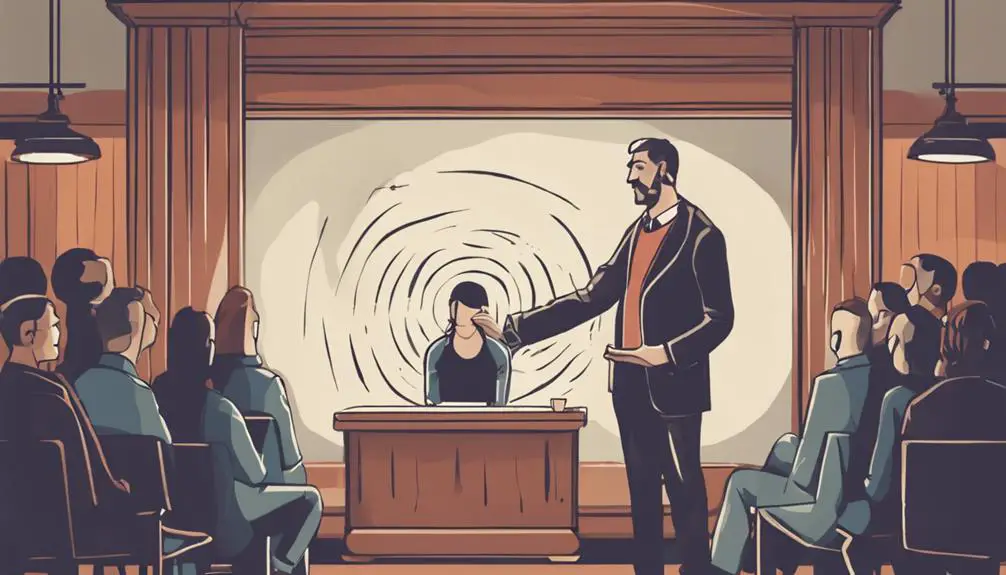Hypnosis Debunked
What Are the Truths Behind Hypnosis Myths?
January 29, 2018 - Hypnosis Debunked
Hypnosis myths are often rooted in misconceptions, but understanding the truths behind them is crucial. Contrary to popular belief, hypnosis does not involve mind control or memory alteration. Individuals under hypnosis retain full control and awareness, debunking the loss of control myth. Moreover, hypnosis extends beyond entertainment and is widely used for therapeutic benefits like overcoming anxiety and phobias. Safety concerns are addressed through ethical practices by trained professionals. Exploring these truths unveils the real potential and positive impact of hypnosis.
Debunking the Mind Control Myth

Contrary to popular belief, hypnosis does not involve mind control or manipulation of an individual's thoughts or actions. Ethical implications play a crucial role in understanding the practice of hypnosis. It is essential to debunk the myth that hypnosis can make someone act against their will.
In reality, hypnosis is a state of focused attention where individuals are more open to suggestion, but they still have full control over their actions. The psychological effects of hypnosis are profound but often misunderstood. Instead of controlling minds, hypnosis can help individuals tap into their subconscious to make positive changes in their lives.
It can be used to alleviate anxiety, manage pain, and even enhance performance. Understanding the ethical boundaries of hypnosis is vital to ensure that individuals are not taken advantage of or put in compromising situations.
Exploring the Memory Alteration Myth
Misconceptions surrounding hypnosis extend beyond the realm of mind control, with another prevalent myth being the idea of memory alteration through hypnosis. It is important to clarify that hypnosis does not allow for the manipulation or alteration of memories. Instead, hypnosis can enhance memory recall by helping individuals relax and focus, potentially aiding in the retrieval of forgotten or repressed memories.
Memory recall during hypnosis is influenced by the individual's suggestibility levels. Suggestibility refers to how open a person is to receiving and acting upon suggestions. While under hypnosis, a highly suggestible person may be more likely to recall memories or experiences vividly, but these memories are not altered or fabricated by the hypnotist.
It is crucial to understand that hypnosis is a tool that can assist in enhancing memory recall and promoting relaxation but does not possess the power to alter memories. By dispelling the myth of memory alteration through hypnosis, individuals can better appreciate the genuine benefits that hypnosis can offer in various therapeutic and self-improvement contexts.
Clarifying the Loss of Control Myth

Addressing concerns often associated with hypnosis, it is important to understand the accurate nature of the belief surrounding the Loss of Control Myth. Contrary to popular belief, hypnosis does not involve the relinquishment of control but rather a shift in control dynamics. Individuals under hypnosis remain fully conscious and aware of their surroundings. What changes during hypnosis is the redirection of attention and heightened suggestibility, allowing the individual to focus on specific suggestions or imagery provided by the hypnotist.
The Loss of Control Myth stems from psychological misconceptions about hypnosis, perpetuated by media portrayals and sensationalized performances. In reality, individuals undergoing hypnosis are active participants in the process, able to reject any suggestions that go against their moral beliefs or values. The hypnotic state is a collaborative effort between the hypnotist and the individual, where trust and cooperation play crucial roles.
Unveiling the Entertainment Only Myth
Dispelling the notion that hypnosis is solely for entertainment purposes, it is essential to recognize the multifaceted applications and benefits of this therapeutic technique. While stage performances often showcase hypnosis as a form of entertainment, it is crucial to understand that hypnosis extends far beyond just that.
In clinical settings, hypnosis is utilized as a powerful tool to help individuals overcome various challenges such as anxiety, phobias, smoking cessation, and even chronic pain management. Through guided relaxation and focused attention, hypnotherapy enables individuals to tap into their subconscious mind to address underlying issues and facilitate positive behavioral changes.
Contrary to the belief that hypnosis is merely a spectacle for entertainment, its clinical applications demonstrate its effectiveness in promoting psychological well-being and enhancing overall quality of life.
Understanding the Safety Concerns Myth

As hypnosis continues to gain recognition for its therapeutic benefits beyond entertainment, it is important to address the misconception surrounding safety concerns associated with this practice. One prevalent myth is that individuals can be made to do things against their will while under hypnosis, leading to safety worries. However, it is crucial to understand that hypnosis is a collaborative process where individuals cannot be forced to act against their moral principles or values.
Numerous effectiveness studies have shown that hypnosis, when conducted by trained professionals, can be a safe and effective tool for addressing various issues such as anxiety, pain management, and smoking cessation. Ethical considerations are paramount in the practice of hypnosis, with reputable practitioners adhering to strict guidelines to ensure the well-being and autonomy of their clients.
It is essential to debunk the misconceptions surrounding safety concerns related to hypnosis and recognize it as a valuable therapeutic modality when utilized responsibly by qualified professionals.
Frequently Asked Questions
Can Hypnosis Make Me Reveal My Deepest Secrets?
Hypnosis, when conducted by a qualified therapist within ethical boundaries, prioritizes privacy concerns and trustworthiness. While it can facilitate deep introspection, divulging secrets isn't guaranteed. Your therapist should guide and respect your boundaries.
Is Hypnosis Dangerous for People With Mental Health Issues?
When considering hypnosis for individuals with mental health issues, ethical considerations are paramount. Understanding misconceptions is crucial. When used ethically by trained professionals, hypnosis can offer potential benefits in therapeutic applications, tailored to individual needs and circumstances.
Can Anyone Be Hypnotized Against Their Will?
Hypnosis relies on voluntary participation and cannot be imposed against one's will due to ethical boundaries. Manipulating someone into hypnosis without consent violates their autonomy and free will, emphasizing the importance of ethical practices.
Does Hypnosis Work the Same for Everyone?
Hypnosis effectiveness varies among individuals due to factors such as suggestibility, motivation, and comfort level. Understanding these individual differences is crucial in tailoring hypnosis sessions to achieve optimal results and address specific needs.
Can Hypnosis Erase Traumatic Memories?
Memory modification through hypnosis poses ethical concerns. While some studies suggest therapeutic benefits, evidence-based research is inconclusive on the erasure of traumatic memories. Caution is advised when considering hypnosis for memory manipulation.
Conclusion
In conclusion, it is important to separate fact from fiction when it comes to hypnosis. By debunking myths surrounding mind control, memory alteration, loss of control, entertainment, and safety concerns, we can better understand the true nature of hypnosis.
It is a powerful tool that can be used for therapeutic purposes, personal development, and entertainment, but it is not a form of mind control or manipulation. It is crucial to approach hypnosis with an open mind and a willingness to explore its potential benefits.
